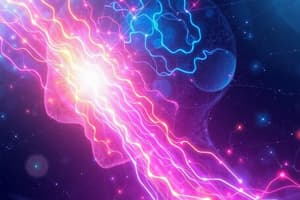Podcast
Questions and Answers
Which of the following best describes the focus of functionalism in psychology?
Which of the following best describes the focus of functionalism in psychology?
- Understanding the influence of the unconscious mind on behavior.
- Studying how behaviors contribute to adaptation and survival. (correct)
- Emphasizing the importance of free will and personal growth.
- Analyzing conscious experiences through introspection.
What is a common misconception about the role of clinical psychologists?
What is a common misconception about the role of clinical psychologists?
- They conduct psychological research exclusively.
- They focus solely on behavioral therapy.
- They only treat severe mental disorders. (correct)
- They provide counseling for mild issues.
In the context of brain research, which technique primarily measures electrical activity in the brain?
In the context of brain research, which technique primarily measures electrical activity in the brain?
- MRI
- CT Scan
- EEG (correct)
- PET Scan
What are the key components of the biopsychosocial model?
What are the key components of the biopsychosocial model?
Which stage of development is characterized by physical and social growth?
Which stage of development is characterized by physical and social growth?
Which of the following lobes of the cerebral cortex is primarily involved in decision-making?
Which of the following lobes of the cerebral cortex is primarily involved in decision-making?
Which psychological concept refers to claims that sound scientific but are not supported by evidence?
Which psychological concept refers to claims that sound scientific but are not supported by evidence?
What does the term 'nature' refer to in the nature vs. nurture debate?
What does the term 'nature' refer to in the nature vs. nurture debate?
What is the main difference between sensation and perception?
What is the main difference between sensation and perception?
Which term describes the conversion of sensory input into neural signals?
Which term describes the conversion of sensory input into neural signals?
In classical conditioning, what does spontaneous recovery refer to?
In classical conditioning, what does spontaneous recovery refer to?
Which of the following best describes operant conditioning?
Which of the following best describes operant conditioning?
What is the primary function of working memory?
What is the primary function of working memory?
What is the role of mnemonics in memory improvement?
What is the role of mnemonics in memory improvement?
Which of the following accurately describes divergent thinking?
Which of the following accurately describes divergent thinking?
What is a common cause of forgetting information?
What is a common cause of forgetting information?
Flashcards
Commonsense Psychology
Commonsense Psychology
Everyday beliefs about behavior and mental processes that often lack careful evaluation and are subject to biases.
Psychological Research Types
Psychological Research Types
Basic research focuses on expanding knowledge, while applied research seeks answers to practical problems.
Structuralism
Structuralism
Early school of thought in psychology that focused on identifying basic elements of conscious experience through introspection (looking inward).
Nervous System
Nervous System
Signup and view all the flashcards
Cerebral Cortex Lobes
Cerebral Cortex Lobes
Signup and view all the flashcards
Nature vs. Nurture
Nature vs. Nurture
Signup and view all the flashcards
Developmental Stages
Developmental Stages
Signup and view all the flashcards
Piaget's Theory
Piaget's Theory
Signup and view all the flashcards
Sensation
Sensation
Signup and view all the flashcards
Perception
Perception
Signup and view all the flashcards
Classical Conditioning
Classical Conditioning
Signup and view all the flashcards
Operant Conditioning
Operant Conditioning
Signup and view all the flashcards
Short-term Memory
Short-term Memory
Signup and view all the flashcards
Encoding
Encoding
Signup and view all the flashcards
Cognition
Cognition
Signup and view all the flashcards
Heuristics
Heuristics
Signup and view all the flashcards
Study Notes
Chapter 1: Foundations of Psychological Science
- Commonsense Psychology: Many common beliefs are inaccurate due to lack of critical evaluation and biases like confirmation bias.
- Pseudoscience: Claims appear scientific but lack evidence.
- Science: Objective approach using observations and experimentation.
- Psychology Specialties: Basic (knowledge focused) and applied (problem-solving). Includes clinical, developmental, forensic, and more.
- Clinical Psychologists: Treat mental disorders.
- Counseling Psychologists: Help with mild issues.
- Historical Perspectives:
- Structuralism: Analyzing conscious experience through introspection.
- Functionalism: Focus on how behaviors help adaptation.
- Behaviorism: Study of observable behavior.
- Psychoanalytic: Focus on unconscious mind's influence.
- Humanistic: Emphasis on free will and growth.
- Biopsychosocial Model: Behavior explained by biological, psychological, and social factors.
- Psychological Science Methods:
- Experimental: Establishing cause-effect relationships.
- Non-experimental: Observational and correlational studies.
Chapter 2: Brain and Behavior
- Nervous System:
- Central (CNS): Brain and spinal cord.
- Peripheral (PNS): Connects CNS to the body.
- Brain Research Techniques: EEG, MRI, PET scans.
Chapter 3: Human Development
- Nature vs. Nurture:
- Nature: Genetic inheritance.
- Nurture: Environmental influences.
- Epigenetics: Interaction between genes and environment.
- Developmental Stages: Prenatal, childhood, adolescence, adulthood.
- Key Theories: Piaget's Cognitive Development, Erikson's Psychosocial Stages.
Chapter 4: Sensation, Attention, and Perception
- Sensation: Raw data received by sensory organs.
- Perception: Interpretation of sensory data.
- Processes:
- Transduction: Conversion of sensory input to neural signals.
- Thresholds: Absolute and difference.
- Attention: Influenced by intensity, novelty, and relevance.
- Perceptual Processing: Bottom-up (sensory-driven) and Top-down (experience-driven).
Chapter 6: Conditioning and Learning
- Classical Conditioning (Pavlov): Associating stimuli to elicit a response.
- Operant Conditioning (Skinner): Behavior influenced by consequences (reinforcement/punishment).
- Observational Learning: Learning through observing others (Bandura's Bobo doll study).
Chapter 7: Memory
- Memory Systems: Sensory, short-term, long-term.
- Memory Processes: Encoding, storage, retrieval.
- Forgetting: Interference, decay, retrieval failure.
- Improving Memory: Mnemonics, rehearsal, organization, and chunking.
Chapter 8: Cognition, Language, and Creativity
- Cognition: Mental processes like thinking, problem-solving, and decision-making.
- Heuristics/Biases: Mental shortcuts and biases in thinking.
- Language: Structures (phonemes, morphemes, syntax), development (stages).
- Creativity: Divergent & convergent thinking.
Studying That Suits You
Use AI to generate personalized quizzes and flashcards to suit your learning preferences.




